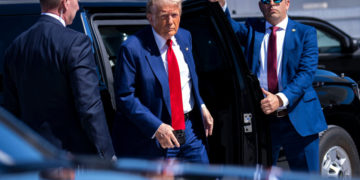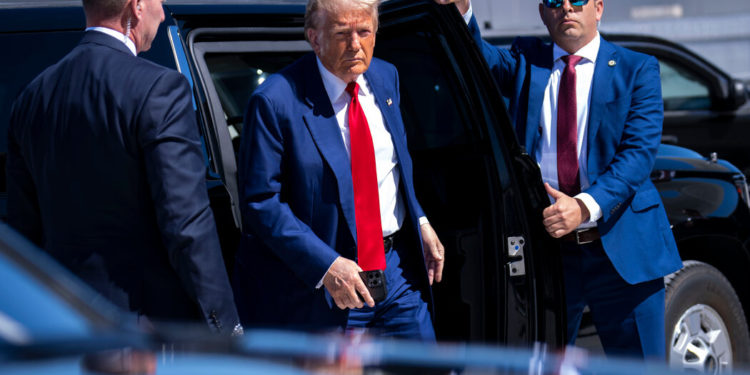The changing politics of the economy
Donald Trump is safe and unharmed after what’s being investigated as a second assassination attempt on his life in the past two months. In fact, his campaign has referenced the incident in its latest fund-raising pitch.
But the issue that still dominates the presidential contest is the economy, which is driving a lot of the discourse and even fanning some controversial elements. (The Fed is set this week to keep the economy in the news, as it’s expected to decide on an interest-rate cut — more below.) And there’s evidence that Trump’s lead on the topic isn’t as strong as it had been.
Kamala Harris may be gaining ground on the economy, according to a new poll by The Financial Times and the University of Michigan’s Ross School of Business. About 44 percent of registered voters trusted the vice president to manage it, compared with 42 percent supporting Trump, within the poll’s margin of error. But of the respondents who watched last week’s debate, 48 percent favored Harris on the economy.
There are other signs that Americans may be changing their outlook. U.S. consumers increasingly feel better about prices and other economic matters, according to the latest sentiment survey conducted by the University of Michigan, published Friday. Meanwhile, Harris supporters have continued to describe her policies as good for business.
Some Republicans worry the Trump campaign is losing focus on the issue. That’s a problem, given that voters still overwhelmingly disapprove of President Biden’s handling of the economy, something indicated even in the FT/Ross poll.
But consider that Trump has recently spent more time discussing, then criticizing, Taylor Swift’s endorsement of Harris. Or that Senator JD Vance has been tied up defending his and Trump’s debunked claims about Haitian migrants eating pets in Springfield, Ohio — which the state’s own Republican governor called a “piece of garbage.”
It’s worth noting that the Ohio controversy is ultimately rooted in economic concerns, given how immigrants have been drawn to Springfield because of plentiful jobs and strained local resources. But Trump and Vance have framed the debate in politically divisive terms, potentially dampening the effectiveness of their arguments.
In a race this close, everything counts. Poll trackers show Harris with only a slim lead overall (even if prediction markets suggest better odds for a Democratic victory in November). So Trump missing out on potent attacks on his opponent could end up mattering down the stretch.
-
In other political news: Many wealthy Americans are calling up experts to rethink their estate planning in anticipation of a Harris victory. And here’s an argument about why some Middle Eastern governments are both hopeful for, and wary of, a second Trump administration.
HERE’S WHAT’S HAPPENING
Shares in Intel rise on a report of a big military contract. The chip maker’s stock was up more than 2 percent in premarket trading on Monday after Bloomberg reported that Intel had secured a $3.5 billion deal to make advanced processors for the Pentagon. It’s a rare bit of good news for Intel of late, as the company’s financial struggles endanger its ability to secure more federal funds and raise questions among investors about its future.
UniCredit keeps up deal pressure on Commerzbank. The Italian lender’s C.E.O., Andrea Orcel, told the newspaper Handelsblatt that a union with its German counterpart would “lead to considerable added value for all stakeholders.” UniCredit’s ambitions have reignited a debate over whether Europe’s banking sector should consolidate, especially as governments sell more of the stakes in lenders they gained as part of 2008-era rescue investments.
Disney dominates the Emmys. “Shogun,” which was produced for FX, set a record for most awards for a show in a single year with 18 wins, while “The Bear” won 11, even if it was upset by HBO’s “Hacks” for best comedy. The wins will be seen as further validation of Disney’s streaming strategy, after the company’s combined services turned a quarterly profit. (Streaming was also a key issue in Disney’s recently concluded contract fight with DirecTV.)
How low will the Fed go?
Stocks are again close to record territory. But that investor enthusiasm belies the uncertainty hanging over the market at the start of a pivotal week for the Fed and the economy.
The central bank on Wednesday is expected to start lowering interest rates for the first time in four years. But two main questions loom ahead of the decision: How big will the cut be? And what will Jay Powell, the Fed chair, say about the economic outlook as employers put the brakes on hiring and he tries to achieve a soft landing?
The market is penciling in a quarter-point cut. But the odds have crept up in recent days that the Fed will opt for a half percentage point reduction.
Central banks typically start lowering interest rates when the economy is flashing warning signs, and the big concern is that a more aggressive move would signal that a soft landing is out of reach.
Banks are warning of potential tough times ahead. JPMorgan Chase’s Jamie Dimon (who’s rarely shy about sharing his most bearish views) warned of stagflation: “I wouldn’t take it off the table.”
Bank stocks have been especially volatile lately. JPMorgan, the country’s biggest lender, has said that lower interest rates could eat into profits. Could that be why Warren Buffett’s Berkshire Hathaway has been selling off its stake in Bank of America in recent weeks?
Don’t rule out a big cut. “It’s a close call between a 25bp and 50bp cut — and could depend on Tuesday’s retail sales reading,” Andrew Hollenhorst, an economist at Citi, wrote in a research report on Friday, noting that any sign that shoppers are pulling back by more than expected could add to growth concerns.
Even if the Fed goes for the smaller move this week, “super-sized cuts are on the table at future meetings,” Aditya Bhave and Stephen Juneau, economists at Bank of America, wrote in a note on Friday.
That would mean talk of deeper cuts would continue through the election season. After Wednesday, the Fed’s next meeting wraps up on Nov. 7, just two days after Election Day.
Rate cuts aren’t always bad news for the markets. Investors often view a lower borrowing-cost environment as a buying opportunity.
As analysts at Charles Schwab point out, the S&P 500 usually experiences a strong one-year return after the Fed starts cutting rates. There is, of course, no guarantee that history will repeat itself. But there is also little sign that the great half-point debate is dashing investor fervor — the S&P 500 just notched its best week of the year.
-
In other central bank news: The Bank of England and the Bank of Japan are also set to announce rate decisions this week.
“I wonder if some substantial part of ‘founder mode’ hinges on ‘building an org around good judgment’.”
— Patrick Collison, the C.E.O. and co-founder of the payments giant Stripe, weighing in on the debate about how founders should run their companies. He argued in a post on X that while they should pay attention to details, they should also hire experts who are great leaders to help oversee the company, as Steve Jobs did at Apple.
TikTok in the dock
TikTok finally gets its day in court on Monday. Lawyers for the video app will make oral arguments in their fight against a law that could see it banned in the United States, The Times’s Sapna Maheshwari writes. But what happens in this case could have consequences that extend far beyond TikTok.
A reminder of how we got here:
-
Washington says TikTok is a threat. The government passed a law in April that would force ByteDance, its Chinese owner, to divest over national security concerns. U.S. lawmakers and intelligence officials have warned that Beijing could use the app to access Americans’ sensitive data or spread disinformation.
-
TikTok sued and mobilized millions of users to back its defense. It argues that a ban would violate Americans’ free speech rights. It also says a divestment isn’t technically or commercially feasible by the Jan. 19, 2025, deadline. For one thing, China could block a divestment to prevent the sale or export of such a successful homegrown technology.
Some mystery surrounds the case. Congress passed the law after members were given classified briefings about TikTok from intelligence officials. And a big chunk of the Justice Department’s arguments have been redacted.
Previous efforts to block TikTok haven’t held up. Montana passed a law last year that would have banned the app in the state on Jan. 1 this year. But a federal judge blocked the ruling, saying it likely violated the First Amendment. Donald Trump tried to ban or force a sale in 2020, but federal courts prevented the Commerce Department from following through.
Still, this case could have ramifications for other companies. The law could have broader implications for how the government polices social media, and some worry that it will introduce overly broad standards. Even Trump now says he opposes a ban. “If you don’t have TikTok, you have Facebook and Instagram — and that’s, you know, that’s Zuckerberg,” he told Bloomberg Businessweek in July.
Regardless, many legal experts expect the TikTok case to go all the way to the Supreme Court.
THE SPEED READ
Deals
-
“Nippon Steel Finds Unlikely Ally in Pittsburgh Workers” (WSJ)
-
Swiggy, the Indian food delivery giant backed by SoftBank and Prosus, is reportedly weighing filing to go public on its home market as soon as this week. (Bloomberg)
-
The venture capital firm Insight Partners is said to have raised roughly $10 billion for its latest investment fund, half what it had originally sought. (FT)
Elections, politics and policy
-
A drop in Alphabet’s stock price — amid antitrust challenges to Google’s parent company — suggests investors are becoming worried that the tech giant might be forced to break up. (WSJ)
-
How Chief Justice John Roberts shaped three Supreme Court decisions that benefited Donald Trump. (NYT)
-
“Donald Trump’s unlikely weed wager” (Politico)
Best of the rest
-
The continued success of “Beetlejuice Beetlejuice” at the box office is propping up Warner Bros. Discovery after a summer of blockbuster misfires. (NYT)
-
How much money does Alan Shaw stand to lose after being fired as Norfolk Southern’s C.E.O.? (Fortune)
-
“America’s institutions retreat from activism” (Axios)
We’d like your feedback! Please email thoughts and suggestions to [email protected].
The post Are Voters Feeling Better About the Economy? appeared first on New York Times.


















